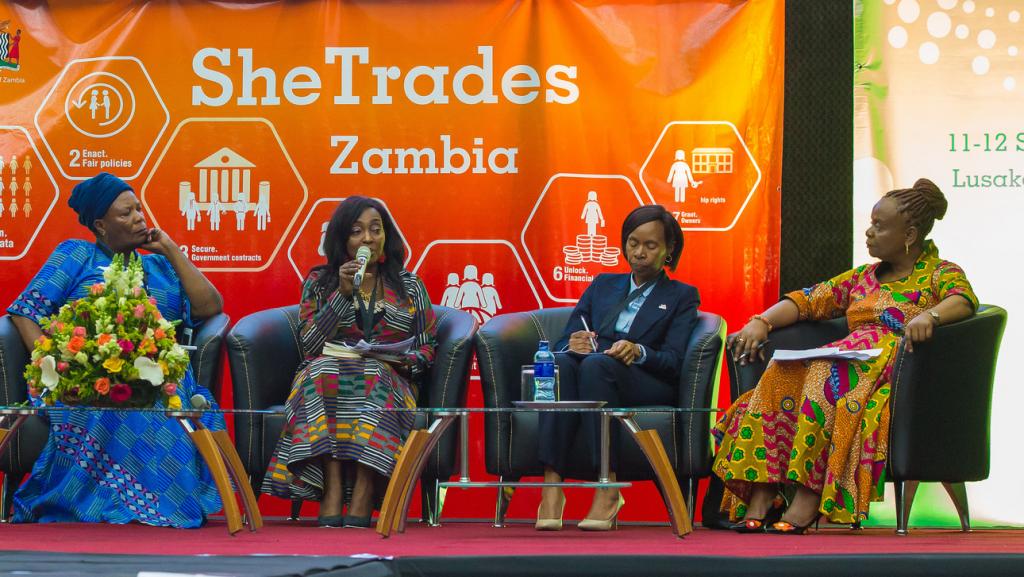SheTrades initiative launched in Zambia on Monday in an effort by the International Trade Centre to promote the work of female entrepreneurs. The Zambian chapter also positively challenges cultural norms for African women, say organisers.
"Women are focused, they're straightforward and they're honest compared to men," says Grace Njapau, a prominent Zambian businesswoman and CEO of Luwi Investments, which has interests across the mining, transport and real estate sectors. “When you lend me money, I’m able to pay it back. A man will go and have a drink with girlfriends,” she adds, in discussion of the qualities of Zambian female entrepreneurs.
SheTrades chapters extend across the African continent. In Kenya, it has trained some 3,000 women, worked with Barclays Bank to help female business owners secure loans worth 2.6 million euros and partnered with eBay to enable enterprises to digitize the sale of their products and services.
SheTrades in Zambia will concentrate on the agribusiness, textile and clothing sectors to improve access to financing and expansion into foreign markets.
"Once SheTrades goes in - we really start to see the results, to see the market linkages, the deals, the sales, the new buyers, the new markets,” says Vanessa Erogbogbo, head of the International Trade Centre’s Women and Trade Programme.
Ghanaian clothing company Afrodesiac Worldwide has been working with SheTrades for the past few years, according to Erogbogbo. It now employs 90 people and is manufacturing modern African-inspired clothing for export to the US and will soon expand to the European market.
The Zambian chapter of SheTrades will initially carry out an assessment of the challenges businesswomen face in the country. However, many of the obstacles Zambian female entrepreneurs deal with are common to the African continent as a whole.
"The challenge that women have is finance, women need to be supported, women have the potential to do business,” says businesswoman Njapau.
Njapau points to the long fight for land rights. Owning land or property and having title deeds remains a struggle for many women and many Zambian men still do not think women should have the same rights they do, she says. This has a knock-on effect when female entrepreneurs want to take out loans to fund their business – the banks ask for collateral, but they do not have any assets to offer as a security against borrowing.
Accessing the export market is another stumbling block, says Maureen Sumbwe, the head of the Zambia Federation of Association of Women in Business. She cites difficulties with scaling up production to meet large orders, dealing with regulations in foreign countries and having the skills to run a multinational business.
Sumbwe, who will be supporting the roll-out of SheTrades in Zambia, sees great potential for women working in the country’s mining sector. But she also hopes that the initiative will help stop women being taken advantage of.
"We have women who own mines, who do value addition to their products, but they're so exploited, they don't get value for the work they’re doing," she says.
Cultural norms
Men should not see empowered female entrepreneurs as a threat, says Sumbwe, they also have a role to play in the SheTrades initiative. "Men should welcome it and be prepared to compete on equal ground," she says on the sidelines of the launch event at the Mulungushi International Conference Centre in Lusaka.
And although the changing of particular cultural norms or subjugation of women more generally is not one of the primary aims of SheTrades, its impact will change the outlook of the typical African or Zambian woman, according to Sumbwe.
“She shouldn’t be out there, she a bit more reserved,” she says of what is expected of Zambian women. “So they take a bit more time to get out there, to work up networks, to get contacts.”
Challenging these cultural norms is not just about women, says Vanessa Erogbogbo, of the International Trade Centre. Male champions are important as well as a range of different stakeholders such as education establishments, institutions dealing with inequality and ministries of trade. All of these are important when it comes to breaking down long standing gender inequalities.
"Every individual has a responsibility to break down those norms," says Erogbogbo, "to understand that we're all equal, that we need to work well together to have societies that function well." - rfi




